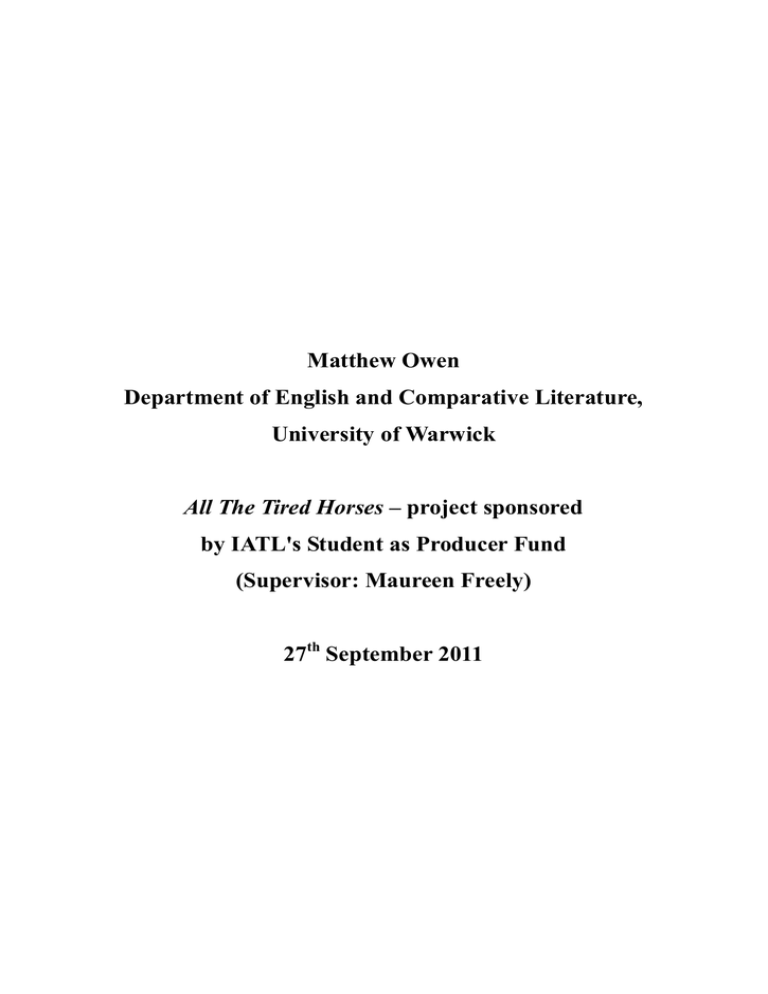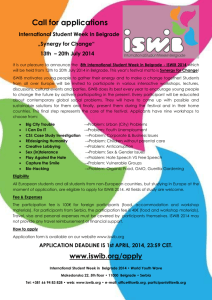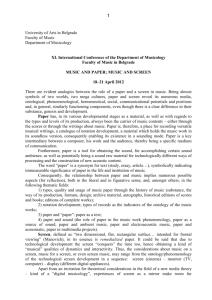Matthew Owen Department of English and Comparative Literature, University of Warwick
advertisement

Matthew Owen Department of English and Comparative Literature, University of Warwick All The Tired Horses – project sponsored by IATL's Student as Producer Fund (Supervisor: Maureen Freely) 27th September 2011 Abstract My project, to put it simply, was a novel. Or, to be more precise, certain sections of a novel. These sections were set in Belgrade, Serbia – a city I had never before visited, and couldn't afford to visit without financial help. The IATL grant enabled me to spend a week in Belgrade this September, during which my research took the shape of exploring, photographing, reading, and talking with an array of locals. In certain ways this research was unquantifiable, in an empirical sense, but it enabled me to gleam the atmosphere of Belgrade and its people in a way that has been hugely beneficial to large sections of the novel. It allowed me to get to a place where I could write comfortably about a city, and produce vastly improved fiction as a result. Introduction My research problem was essentially that I was trying to write about a city, a setting, which I had never experienced. While it is possible, in principle, to write about a place you have never visited – Bram Stoker penned Dracula without ever having visited Transylvania, to give just one example – the core of my novel (with its central theme of exile and displacement) relies heavily on the city of Belgrade – on its mood, its feel, its people, its recent history – in a way that was difficult to simply imagine. I had read numerous histories of the city, watched films (Ране – The Wounds; Лепа села лепо горе – Pretty Village, Pretty Flame) and books (Diary of Interrupted Days, by Dragan Todorovic; Leeches, by David Albahari) set there, but still I felt like I was faking it when I tried to set a scene in the city. I felt like I was writing synthetically, like a conduit for impressions which I'd simply appropriated from others, rather than gaining myself. The only way – the only way – to overcome this, was to visit it myself, and to – to use a cliche – 'soak it up'. The aim of my research, then, was to use the visit – made possible by the grant – in order to get to a place where I felt totally comfortably, artistically, in writing about the fascinating city that is Belgrade. To place where I could root conversations with Belgraders, and events amidst the city's streets, as well as more mundane things like the weather and the cost of a loaf of bread, in experience, and not just pure fancy or rehashed retellings. No only would this improve the novel itself, and improve my experience of writing the novel, but it would do better justice to Belgrade, a city which – like any city – deserves to be given a faithful and accurate portrayal. Methodology My method, in many ways, was somewhat freeform. It lacked the clear, objective-driven nature of a scientific experiment, or an academic study. What I was trying to obtain was something quite ethereal; an understanding of, and a feel for, a city. So, what I did for the first few days, was simply walked. I had a couple of streets written down which I'd already marked as priority places to go and see, due to the fact that they heavily in the novel as sites in which the protagainst lives and works - Kosančićev Venac and Strahinjica Bana. Because these two streets are spread quite well across the top of Belgrade's old town, I could basically take a long, meandering route between them, making sure to explore Kalemegdan (the city park) and other places of note along the way. In both these locations, I found a coffeeshop (Belgrade is replete with coffeeshops), sat outside, and – to use yet another cliche – watched the world go by. The weather was warm, so it was perfect for just sitting outside and taking in the street; its rythmns, its feel, its people. I watched the people around me, made notes, talked to locals (all of whom had exceptional English), and even used by basic, snail's-pace Cyrillic to read some of the local papers' front pages. This – this wandering, and exploring – took up a lot of my time, chiefly over the first two days, but over the other five as well. Friedrich Nietzsche said that “all truly great thoughts are conceived by walking,” and past experience has suggested to me that this is true. So I walked, and I thought. In the evenings, I didn't walk quite as much, but I struck up conversations. The Serbs are a warm, hospitable people, with (as I said) almost uniformally excellent English, and they seemed more than willing to talk about the city and its recent history. Some of my most valuable research came from these long conversations, during which I would try (with varying results) to dodge the constant offers of plum brandy, before scurrying back to my apartment to make notes. Better still, I managed to meet a couple of friends and family members of some of my Serbian contacts here in the UK, who took me off the tourist trail to some genuine local restaurants, and provided me with some great information and anecdotes. A number of the city's museums were extremely helpful in getting to grips with Belgrade's history and culture, and I toured these on my third day in the city: The Ethnographic Museum was excellent for a broad view of Serbian culture and heritage; the Nikola Tesla Museum was an engaging and charming little exhibition dedicated to one of the city's favourite sons; the Museum of the "Banjica" Concentration Camp was a harrowing but important view into Serbia's Second World War history, and the Museum of Ivo Andrić was a breathtaking goldmine of the great writer's personal belongings and historical trinkets. On the whole, these museum tours gave me some great insight into the history – and the historiography – of Belgrade and its people. On the last few days, I took some trips outside of the Old Town – to New Belgrade, west of the Sava River, and Zemun, the Jewish quarter – to give me a broader, better understanding of the city as a whole. It was interesting chatting to people here, not least for the regionalised sentiments that I'd been missing by staying in the downtown area. Results As stated, quantifying what I gained from my research trip is difficult. It wasn't an empirically conducted experiment, with clear factors and outcomes. But the sections of my novel set in Belgrade are vastly improved as a result of my visit. Indeed – for a semi-empirical indication of how helpful the trip was – it is only after editing certain chapters that I have, very recently, and off the back of the improved manuscript, acquired a literary agent. Conclusion and outcome The conclusion of my research trip was in essence a range of perceptions and impressions of the city of Belgrade. When I say 'the city of Belgrade', I mean that in its widest possible sense – not just the physical city, but its people, its look, its feel, its style, its attitudes. These range from the very straightforward – the fact that vegetarians are only second to non-smokers in being seen as a strange, eccentric class of people; the fact that all the buskers use accordians; the fact that beer is cheaper than Coca-Cola; the fact that Kosovo is still a contentious political subject, not the halfforgotten piece of recent history that it is in the West – to the less firm, the more speculative – the impression of a city with a weird identity crisis, suspended between Western and Eastern cultural currents, a victim of its geographical position along the war lines of old and bigger empires which now feels somehow forgotten by the 21st century. In terms of disseminating my newly acquired knowledge within and beyond my department and the university - as previously stated, upon editing and vastly improving the sections of my novel which feature the city of Belgrade, I sent the opening section to a literary agent who had previously expressed interest in my work. After reading it, they signed me to their agency; the first time they have ever done such a thing on the basis of anything less than a full book. They said that they were highly impressed with the atmosphere and tone of the novel, especially the sections set in Belgrade. Needless to say, it is my hope that upon finally finishing the novel, my agent will be able to strike a deal with publishers, and maybe – fingers crossed – the thing will get published. Then, depending on the its success, the knowledge instilled in the novel could be disseminated who knows how far. For now, just within the department, it has helped other students – one of whom was also writing something set in the Balkans, and another of whom wanted to look at how, stylistically, I'd conveyed a foreign city without sounding didactic, or like a tour guide.

